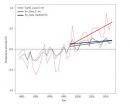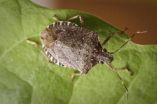(Press-News.org) Loads of studies over the years have shown that children who were breastfed score higher on IQ tests and perform better in school, but the reason why remained unclear.
Is it the mother-baby bonding time, something in the milk itself or some unseen attribute of mothers who breastfeed their babies?
Now a new study by sociologists at Brigham Young University pinpoints two parenting skills as the real source of this cognitive boost: Responding to children's emotional cues and reading to children starting at 9 months of age. Breastfeeding mothers tend to do both of those things, said lead study author Ben Gibbs.
"It's really the parenting that makes the difference," said Gibbs. "Breastfeeding matters in others ways, but this actually gives us a better mechanism and can shape our confidence about interventions that promote school readiness."
Gibbs authored the study with fellow BYU professor Renata Forste for the March issue of the Journal of Pediatrics. According to their analysis, improvements in sensitivity to emotional cues and time reading to children could yield 2-3 months' worth of brain development by age 4 (as measured by math and reading readiness assessments).
"Because these are four-year-olds, a month or two represents a non-trivial chunk of time," Gibbs said. "And if a child is on the edge of needing special education, even a small boost across some eligibility line could shape a child's educational trajectory."
The BYU scholars utilized a national data set that followed 7,500 mothers and their children from birth to five years of age. The data set is rich with information on the home environment, including how early and how often parents read to their kids. Additionally, each of the mothers in the study also participated in video-taped activities with their children. As the child tried to complete a challenging task, the mother's supportiveness and sensitivity to their child's emotional cues were measured.
The study gained editorial praise from child development expert Sandra Jacobson of Wayne State University School of Medicine. She noted that children in the study who were breastfed for 6 months or longer performed the best on reading assessments because they also "experienced the most optimal parenting practices.
"Gibbs and Forste found that reading to an infant every day as early as age 9 months and sensitivity to the child's cues during social interactions, rather than breastfeeding per se, were significant predictors of reading readiness at age 4 years," wrote Jacobson.
The BYU researchers note that the most at-risk children are also the least likely to receive the optimal parenting in early childhood. Single moms in the labor force, for example, don't have the same luxuries when it comes to breastfeeding and quality time with the children. Parents with less education don't necessarily hear about research-based parenting practices, either.
"This is the luxury of the advantaged," Forste said. "It makes it harder to think about how we promote environments for disadvantaged homes. These things can be learned and they really matter. And being sensitive to kids and reading to kids doesn't have to be done just by the mother."
INFORMATION:
The study is titled "Breastfeeding, Parenting and Early Cognitive Development."
Study shows why breastfed babies are so smart
Two parenting skills deserve the credit
2014-02-26
ELSE PRESS RELEASES FROM THIS DATE:
Still-fresh remnants of Exxon Valdez oil protected by boulders
2014-02-26
HONOLULU – Twenty-five years after the infamous Exxon Valdez oil spill in Prince William Sound, beaches on the Alaska Peninsula hundreds of kilometers from the incident still harbor small hidden pockets of surprisingly unchanged oil, according to new research being presented here today.
The focus of the study is to learn how oil persists long after a spill. Researchers presenting the work caution that the amount of oil being studied is a trace of what was originally spilled and that results from these sites cannot be simply extrapolated to the entire spill area.
The ...
Fox Chase researchers discover new mechanism of gene regulation
2014-02-26
In the cells of humans and other organisms, only a subset of genes are active at any given time, depending largely on the stage of life and the particular duties of the cell. Cells use different molecular mechanisms to orchestrate the activation and deactivation of genes as needed. One central mechanism is an intricate DNA packaging system that either shields genes from activation or exposes them for use.
In this system, the DNA strand, with its genes, is coiled around molecules known as histones, which themselves are assembled into larger entities called nucleosomes. ...
Harvested rainwater harbors pathogens
2014-02-26
South Africa has been financing domestic rainwater harvesting tanks in informal low-income settlements and rural areas in five of that nation's nine provinces. But pathogens inhabit such harvested rainwater, potentially posing a public health hazard, especially for children and immunocompromised individuals, according to a team from the University of Stellenbosch. The research was published ahead of print in Applied and Environmental Microbiology.
International studies had indicated that harvested rainwater frequently harbors pathogens, and that, in light of the financing ...
No warming hiatus for extreme hot temperatures
2014-02-26
Extremely hot temperatures over land have dramatically and unequivocally increased in number and area despite claims that the rise in global average temperatures has slowed over the past 10 to 20 years.
Scientists from the ARC Centre of Excellence for Climate System Science and international colleagues made the finding when they focused their research on the rise of temperatures at the extreme end of the spectrum where impacts are felt the most.
"It quickly became clear, the so-called "hiatus" in global average temperatures did not stop the rise in the number, intensity ...
Beta-catenin alters T cells in lasting and harmful ways
2014-02-26
Activation of beta-catenin, the primary mediator of the ubiquitous Wnt signaling pathway, alters the immune system in lasting and harmful ways, a team of Chicago-based researchers demonstrate in the February 26, 2014, issue of Science Translational Medicine.
An increase in beta-catenin in certain types of T cells—a class of white blood cells—causes chronic inflammation in the intestine and colon, eventually leading to cancer. The same mechanism is used by colon cancer to propagate itself. The researchers combine data from patients suffering from colitis or colon cancer ...
Hubble monitors supernova in nearby galaxy M82
2014-02-26
This is a Hubble Space Telescope composite image of a supernova explosion designated SN 2014J in the galaxy M82. At a distance of approximately 11.5 million light-years from Earth it is the closest supernova of its type discovered in the past few decades. The explosion is categorized as a Type Ia supernova, which is theorized to be triggered in binary systems consisting of a white dwarf and another star — which could be a second white dwarf, a star like our sun, or a giant star.
Astronomers using a ground-based telescope discovered the explosion on January 21, 2014. This ...
Characterization of stink bug saliva proteins opens door to controlling pests
2014-02-26
Brown marmorated stink bugs cause millions of dollars in crop losses across the United States because of the damage their saliva does to plant tissues. Researchers at Penn State have developed methods to extract the insect saliva and identify the major protein components, which could lead to new pest control approaches.
"Until now, essentially nothing was known about the composition of stink bug saliva, which is surprising given the importance of these insects as pests and the fact that their saliva is the primary cause of feeding injury to plants and crop losses," said ...
New data book outlines Hispanic/Latino health
2014-02-26
The National Heart, Lung, and Blood Institute, part of the National Institutes of Health, released the largest and most comprehensive health and lifestyle analysis of people from a range of Hispanic/Latino origins. The data will enable individuals, communities, and policy makers to tailor better health intervention strategies.
"This study lays the foundation for future research on the possible causes of chronic diseases and ways to prevent them, and to help us understand the reasons why Hispanics and Latinos live longer than the general population," said Gregory Talavera, ...
Research maze puts images on floor, where rodents look
2014-02-26
PROVIDENCE, R.I. [Brown University] — A rodent in a maze is a staple — even a stereotype — of experimental psychology research. But the maze in the lab of Rebecca Burwell, professor of cognitive, linguistic, and psychological sciences at Brown University, is not your grandfather's apparatus. In a new video article published in the Journal of Visualized Experiments, Burwell's research group demonstrates in full detail how the maze can be used to perform automated visual cognitive research tasks with great efficiency.
The article is available here: http://www.jove.com/video/51316/automated-visual-cognitive-tasks-for-recording-neural-activity-using
The ...
Mayo Clinic discovers African-Americans respond better to rubella vaccine
2014-02-26
ROCHESTER, Minn. — Feb. 26, 2014 — Somali Americans develop twice the antibody response to rubella from the current vaccine compared to Caucasians in a new Mayo Clinic study on individualized aspects of immune response. A non-Somali, African-American cohort ranked next in immune response, still significantly higher than Caucasians, and Hispanic Americans in the study were least responsive to the vaccine. The findings appear in the journal Vaccine.
"This is fascinating," says Gregory Poland, M.D., Mayo Clinic vaccinologist and senior author of the study. "We don't know ...
LAST 30 PRESS RELEASES:
University of Oklahoma researchers develop durable hybrid materials for faster radiation detection
Medicaid disenrollment spikes at age 19, study finds
Turning agricultural waste into advanced materials: Review highlights how torrefaction could power a sustainable carbon future
New study warns emerging pollutants in livestock and aquaculture waste may threaten ecosystems and public health
Integrated rice–aquatic farming systems may hold the key to smarter nitrogen use and lower agricultural emissions
Hope for global banana farming in genetic discovery
Mirror image pheromones help beetles swipe right
Prenatal lead exposure related to worse cognitive function in adults
Research alert: Understanding substance use across the full spectrum of sexual identity
Pekingese, Shih Tzu and Staffordshire Bull Terrier among twelve dog breeds at risk of serious breathing condition
Selected dog breeds with most breathing trouble identified in new study
Interplay of class and gender may influence social judgments differently between cultures
Pollen counts can be predicted by machine learning models using meteorological data with more than 80% accuracy even a week ahead, for both grass and birch tree pollen, which could be key in effective
Rewriting our understanding of early hominin dispersal to Eurasia
Rising simultaneous wildfire risk compromises international firefighting efforts
Honey bee "dance floors" can be accurately located with a new method, mapping where in the hive forager bees perform waggle dances to signal the location of pollen and nectar for their nestmates
Exercise and nutritional drinks can reduce the need for care in dementia
Michelson Medical Research Foundation awards $750,000 to rising immunology leaders
SfN announces Early Career Policy Ambassadors Class of 2026
Spiritual practices strongly associated with reduced risk for hazardous alcohol and drug use
Novel vaccine protects against C. diff disease and recurrence
An “electrical” circadian clock balances growth between shoots and roots
Largest study of rare skin cancer in Mexican patients shows its more complex than previously thought
Colonists dredged away Sydney’s natural oyster reefs. Now science knows how best to restore them.
Joint and independent associations of gestational diabetes and depression with childhood obesity
Spirituality and harmful or hazardous alcohol and other drug use
New plastic material could solve energy storage challenge, researchers report
Mapping protein production in brain cells yields new insights for brain disease
Exposing a hidden anchor for HIV replication
Can Europe be climate-neutral by 2050? New monitor tracks the pace of the energy transition
[Press-News.org] Study shows why breastfed babies are so smartTwo parenting skills deserve the credit




